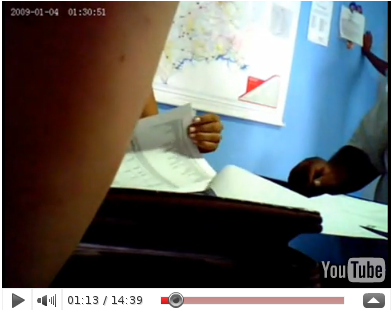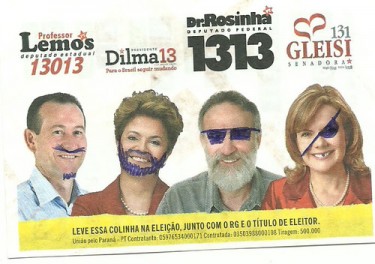Election day finally arrives on the 3rd of October for more than 135 million voters in Brazil, after a heated three month period of electoral campaign. Many Brazilian citizens have followed the motto “DIY: Clean Elections” by monitoring the tactics adopted by supporters of the candidates for Presidential and General elections. Today, the 1st of October, bloggers from all over the country unite in a collective blogging initiative, expressing their “netcitizenship” and demanding clean elections [pt]. The initiative is promoted by Eleitor2010 and represents the culmination of twelve weeks of the campaign during which Brazilians have taken a stand on social media and denounced more than eight hundred cases of electoral crimes [pt].
Elections happen every two years in Brazil. This year, citizens are deciding who will be the next President of the Republic, as well as all 513 Chamber of Deputies seats and fifty-four of the Federal Senate seats, along with governorships and state legislatures of all 26 states and the Federal District. A second round will be held on October 31 if a candidate for President or Governor fails to achieve more than half of the valid votes.
Lula da Silva was a charismatic Chief of State who served two four-year terms, elected in 2002 and 2006, by majority vote. His successor candidate, Dilma Roussef, is running ahead in the polls, followed by social-democrat José Serra, and the former minister of Environment Marina Silva. There are six other candidates for President.

Placa Porca (Dirty Board, pt) promotes art to denounce electoral crimes related to the garbage created by political ads in public spaces.
The campaign strategies that candidates and their supporters have adopted often left much to be desired from a legal standpoint. Several online initiatives have monitored the electoral campaign, such as Knight Center’s map of electoral censorship in Brazil, Placa Porca‘s map of artistic interventions on election posters in São Paulo and Eleitor2010. The doors have opened for what could be a new paradigm of participatory citizenship, where citizens make their voices heard concerning the way politics happen in Brazil. From political propaganda in churches [pt] to bribed tweets [pt] and vote buying [pt] candidates often simply ignore how Brazilian law restricts campaigning, but some citizens do not let it go unchallenged.
Such is the case of Deputy Chamber candidate Edmar Moreira, who has once again brought an old story back into the spotlight. A Global Voices post from the beginning of 2009, gathered bloggers reactions to the fact that Moreira, former Vice-President and Ethics Magistrate of the Brazilian Chamber of Deputies, has a medieval-style castle in the state of Minas Gerais, that the tax office does not know about. “Will he be investigated?” Apparently not, as he is once again running for office in this year’s elections even though “Mona Lisa Castle” still has not been declared at its full value, and neither have pending cases against him been decided [pt]. The case was submitted to Eleitor2010, and netcitizens have confirmed that also his son Leonardo Moreira, is running for State Deputy
A candidatura desse indivíduo é uma vergonha e uma afronta a todos nos, e se repararem bem, ele não declara este bem em sua inscrição.
Other candidates have been accused of organizing “showmicios”, show-rallies, for the sake of entertainment. Too bad that the law doesn’t approve candidates sponsorship for that kind of events before the elections. A citizen report denounced Gony Arruda’s gathering in a Reggae Club [pt]
Só que Gony Arruda é candidato a deputado estadual do Ceará pelo PSDB, e o convite estampa bem grande o nome e o número do sujeito, o que caracteriza showmício. Que estão acontecendo showmícios não é surpresa, mas que cara de pau fazer isso assim, às claras no twitter e por email!

Screenshot from a video that testifies a buying vote scheme assembled in Rio Verde / Goiás, denounced on Eleitor2010
The circulation of spam messages has been a recurrent electoral crime. Citizens complain about how their personal information has gotten into the hands of spammer candidates. Mainstream media [pt] covered the story of students whose personal data had been taken out from ProUni, a governmental information system from the Ministry of Education and misused for online campaign. Ibrahim Cesar reported the incident and writes about his worries [pt]
Ora, o que isso significa? O órgão governamental que controla o programa cedeu meu endereço eletrônico para a campanha deste sujeito que não merece ser eleito. Meus dados. Conseguem entender isso? O ProUNI tem toda a minha informação financeira e de toda minha família. Para receber o benefício você é obrigado a agregar centenas de certidões, documentos, etc. Que outros usos podem fazer destes meus dados? Sinto-me como se meus direitos civis não valessem nada para essa administração.
Though mainstream media has broadcasted some bizarre strategies adopted by the politicians to gain voters, social media has been a true cluster for electoral crimes in Brazil. At the same time, social media has also played a major role in providing expression spaces for citizen participation in the processes of democracy.
A collaborative coverage of elections on the web will be brought by 48h Democracia [48h Democracy, pt]. They aim to bring video, news reports and bulletins from netcitizens of all over the country and give a different perspective of the elections from the mainstream media.








2 comments